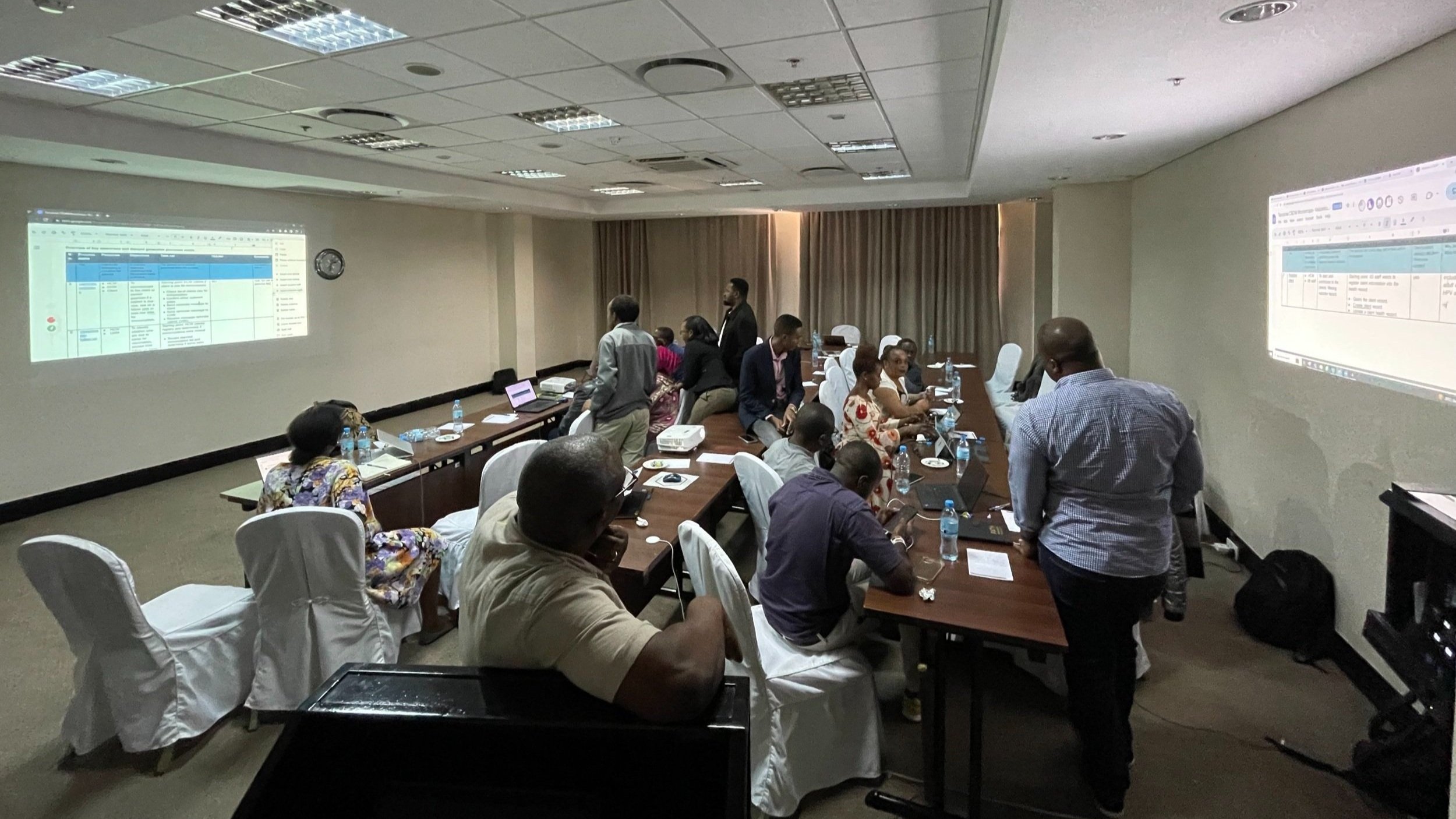Tanzania's path to pandemic preparedness: Strengthening immunization digital health systems
By: Victory Kamthunzi, Communications Officer, Digital Square
Tanzania's Ministry of Health (MOH) stakeholders, GIZ and Digital Square at PATH team at the Validation and User Requirement Gathering workshops in Arusha
The Deutsche Gesellschaft für Internationale Zusammenarbeit (GIZ) and Digital Square at PATH, through the Digital Innovation in Pandemic Control (DIPC) project, are working together with ministries of health and other stakeholders in Ghana, Malawi, and Tanzania to develop pandemic-prepared immunization systems by improving and developing digital tools. This collaboration seeks to scale up the use of digital tools for COVID-19 and routine vaccination planning, deployment, and monitoring.
Mapping the digital immunization ecosystem
In collaboration with the Government of Tanzania, Digital Square analyzed Tanzania's existing immunization ecosystem to identify gaps, challenges, and opportunities for strengthening digital immunization systems in Tanzania. By reviewing health and digital governance documents and consulting with key stakeholders, Digital Square gathered valuable insights to produce a comprehensive country profile. This profile is a resource for Tanzania's Ministry of Health (MOH) and other stakeholders to help inform the development and operationalization of interoperable digital solutions to support immunization.
Main DIPC project activities in Tanzania
Based on the findings from the ecosystem mapping, Digital Square and the Ministry of Health (MOH) are acting to enhance Tanzania's digital health immunization systems by:
Reviewing and standardizing workflows: Workflows can be defined “as a process involving a series of tasks performed by various people within and between work environments to deliver care.”[1] This thorough review and standardization of end-to-end immunization workflows, processes, data standards, business logic, and requirements (See Figure 1) will help effectively strengthen and scale digital tools for immunization.
Figure 1: High-level immunization product suite workflow
2. Mapping existing digital tools: Three existing digital tools for immunization in Tanzania were mapped: Tanzania Immunization Registry (TImR) (developed in partnership with PATH), the COVID-19 Vaccination Management System (Chanjo COVID), and the Vaccine Information Management System (VIMS). The next step is to map these tools against a standard set of requirements to identify gaps and areas for improvement.
3. Facilitating secure information exchange: The DIPC project will upgrade the current electronic immunization registry (i.e., TImR) so that it can securely exchange information with other digital systems in the digital health architecture framework, such as District Health Information Software 2 (DHIS2). This will increase data utilization to improve immunization service delivery such as enabling health workers to better plan for vaccine supply chain and delivery (e.g., reduce stockouts of life-saving medicines).
4. Strengthening capacity: To ensure the sustainability of digital health solutions, the DIPC project aims to bolster the capacity of local technical teams to effectively own and manage the digital tools by mentoring and training them. For example, Digital Square is partnering with local technical teams to integrate World Health Organization (WHO) and MOH guidelines and recommendations using the WHO's standards-based, machine-readable, adaptive, requirements-based, and testable (SMART) Guidelines approach into TImR.
Validation workshop in Arusha
To further understand Tanzania's digital health ecosystem, Digital Square organized a validation workshop in Arusha, Tanzania, to collaborate with the MOH under the Immunization and Vaccine Development (IVD) program and the Information and Communication Technology (ICT) department. The workshop brought together 32 key national, sub-national, and facility stakeholders (14 female and 18 male), including the MOH-IVD monitoring and evaluation department, implementing partners, and GIZ Tanzania Country Office representatives.
DIPC Project Validation workshop in Arusha, Tanzania
DIPC Project Validation and User Requirement Gathering workshop in Arusha
Digital Square adopted a user-centered approach (e.g., validating business processes, developing user personas and requirements) for participants to identify pain points and challenges within the immunization workflows. End users shared their challenges using systems categorized according to WHO's Classifications of Digital Health Interventions, including a lack of interoperability (i.e., ability of digital systems to talk to one another). For instance, the TImR system is not currently exchanging information with other systems in the ecosystem even though it is adhering to the FHIR® standard. FHIR (Fast Healthcare Interoperability Resources) is a standard created by HL7 which makes it easier for digital systems to talk to one another (i.e., securely exchange information) by presenting data that is standardized, consistent, and understandable by multiple systems. The workshop facilitated a deeper understanding of the high-level business processes for immunization systems (e.g., managing inventory), enabling the MOH to lead and shape digital transformation initiatives to strengthen immunization.
The DIPC project is making significant strides to strengthen digital health systems for immunization (i.e., TImR) in Tanzania. Digital Square is paving the way for a more efficient and sustainable digital health ecosystem through comprehensive mapping, analysis, and stakeholder engagement. As the DIPC project progresses, its impact will extend beyond Tanzania, benefiting other countries involved, such as Ghana and Malawi. By harnessing the power of digital tools and collaborative efforts, we can create a future where robust and interconnected digital health systems support pandemic control and immunization.
[1] Davis MM, Gunn R, Cifuentes M, Khatri P, Hall J, Gilchrist E, Peek CJ, Klowden M, Lazarus JA, Miller BF, Cohen DJ. Clinical Workflows and the Associated Tasks and Behaviors to Support Delivery of Integrated Behavioral Health and Primary Care. J Ambul Care Manage. 2019 Jan/Mar;42(1):51-65. doi: 10.1097/JAC.0000000000000257. PMID: 30499901; PMCID: PMC6278604.





